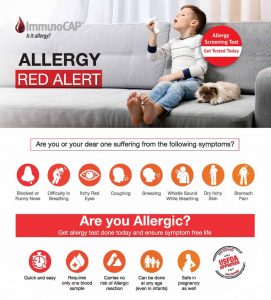Summer Allergies: Causes, Symptoms & Management Tips

The warm breeze of summer brings along not just sunshine but also a host of allergies. Although these allergies are a seasonal phenomenon, they are harmful because, if left untreated, they can result in severe health issues, including sinus infections. So, it’s important to understand summer allergies, their causes and symptoms, and what preventive measures people can take to enjoy this vibrant season without discomfort.
Summer Allergies
Summer allergies usually begin in June and last till September, with symptoms peaking in June and July. During this season, the weather is warm and humid. These conditions are perfect for the growth of moulds. They release spores in the air and, when inhaled, can cause allergies.
Another frequent culprit is pollen, which is released by trees, grasses, and weeds. During summer, pollen counts in the air tend to be high, leading to more allergic reactions.
When a person allergic to these substances is exposed to these allergens, their body produces histamine. It is a chemical compound produced by the immune system and causes swelling, itchiness, etc.
What are Some Common Summer Allergy Causes?
Summer allergies can result from a wide range of allergens, ranging from plant pollen to moulds and insects. Here are some common summer allergy causes:
-
Pollens
Pollination among trees is completed by spring. However, weeds and grasses only begin pollinating in the summer. Coming in contact with pollens of the following weeds is known to cause allergies:
- Cockle weed
- Pigweed
- Ragweed
- Russian thistle
- Sagebrush
- Tumbleweed
Similarly, pollens from the grasses listed below also cause summer allergies:
- Bermuda
- Blue grasses
- Orchard
- Red top
- Sweet vernal
- Timothy
Pollens, especially ragweed, can travel greater distances when released into the atmosphere due to blowing wind. Therefore, they can still affect people who are allergic to them even if ragweed doesn’t grow in their region.
-
Mould Spore
Moulds develop in damp environments like basements and washrooms. Similar to pollen, their spores get airborne and cause allergic reactions when inhaled.
-
Insect Bites
Summer brings many vegetables, fruits, and flowers, but it also has an abundance of insects. Common culprits include bees, fire ants, hornets, wasps, and yellow jackets. Their sting and bite can cause severe allergic reactions in people who are allergic to insects’ venom or saliva.
-
Dust Mites
Dust mites are microscopic creatures found indoors or where dust accumulates over time, such as mattresses, pillows, sofas, heavy curtains, and even clothes. Their waste products and decomposed bodies can trigger allergic reactions.
-
Air Pollution
Air pollution doesn’t directly cause allergies. However, smog and ozone formation at the ground level (created when sunlight reacts with chemicals from vehicles’ exhausts) are known to worsen the symptoms in allergic patients.
What are Some Common Summer Allergy Symptoms?
Commonly appearing summer allergy symptoms include:
- Persistent sneezing
- Runny and congested nose
- Redness, itchiness and watering in the eyes
- Coughing and wheezing
- Difficulty in breathing, especially among asthma patients
- Rashes and itching on the skin
- Frequent allergic reactions can lead to feelings of tiredness and fatigue
How to Diagnose Summer Allergies?
Diagnosing summer allergies follows a similar process to diagnosing other seasonal allergies. Patients typically undergo an allergy test to identify which allergens are causing their symptoms. During the test, the doctor exposes a small area on the arm or back to an allergen. If the patient exhibits a reaction, such as a rash or itchiness, it confirms that the patient is allergic to that particular substance.
How to Prevent Summer Allergies?
Taking an allergy test helps pinpoint the exact allergens responsible for the patient’s symptoms so they can take measures to prevent exposure to those allergens. Here are some effective ways to avoid summer allergies:
- Keep windows closed to stop dust and pollen from entering the house.
- Cover mouth, nose, and eyes to avoid exposing them to allergens.
- Wear full-sleeved clothes outdoors.
- Limit outdoor activity.
- Take a shower after spending time outdoors.
Summer allergies are a common occurrence that usually accompany milder symptoms. However, if left untreated, they can turn into severe health issues and infections. Doctors advise patients to take antihistamines to relieve summer allergy symptoms. However, any medication should only be taken after consulting an allergy specialist.
People who are aware of allergens that trigger allergic reactions in their bodies must take measures to avoid exposure to those substances. People who aren’t aware of allergens that can affect them must book an allergy test with Dr Lal PathLabs.
FAQs
1. What are summer allergy symptoms?
Summer allergy symptoms include sneezing, runny or congested nose, itchy and watery eyes, coughing, wheezing, skin rashes, and fatigue.
2. What age do seasonal allergies start?
Seasonal allergies can begin at any age but commonly start affecting people in childhood or adolescence.
3. How can I permanently stop allergies?
Currently, there’s no permanent cure for allergies. However, certain medications can help relieve symptoms. Avoiding allergens also helps reduce the risk of allergic reactions.














